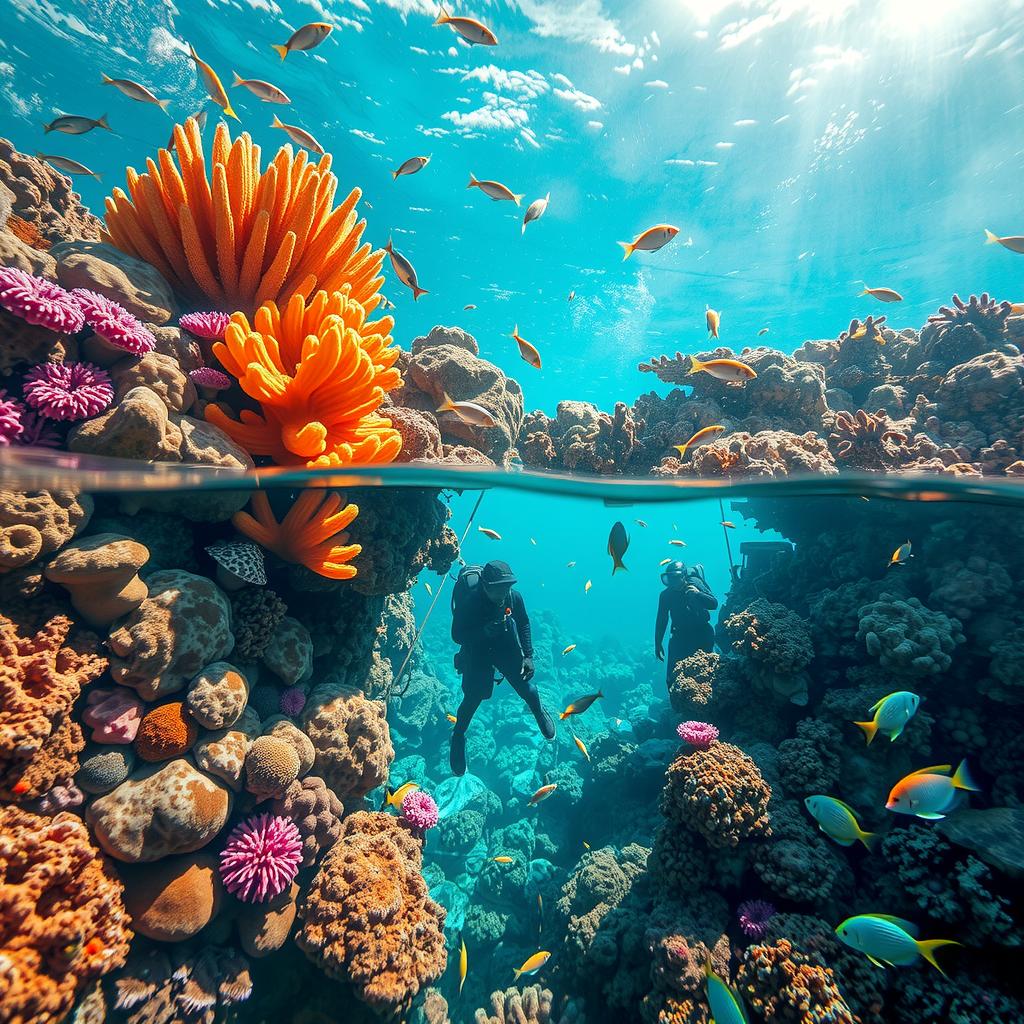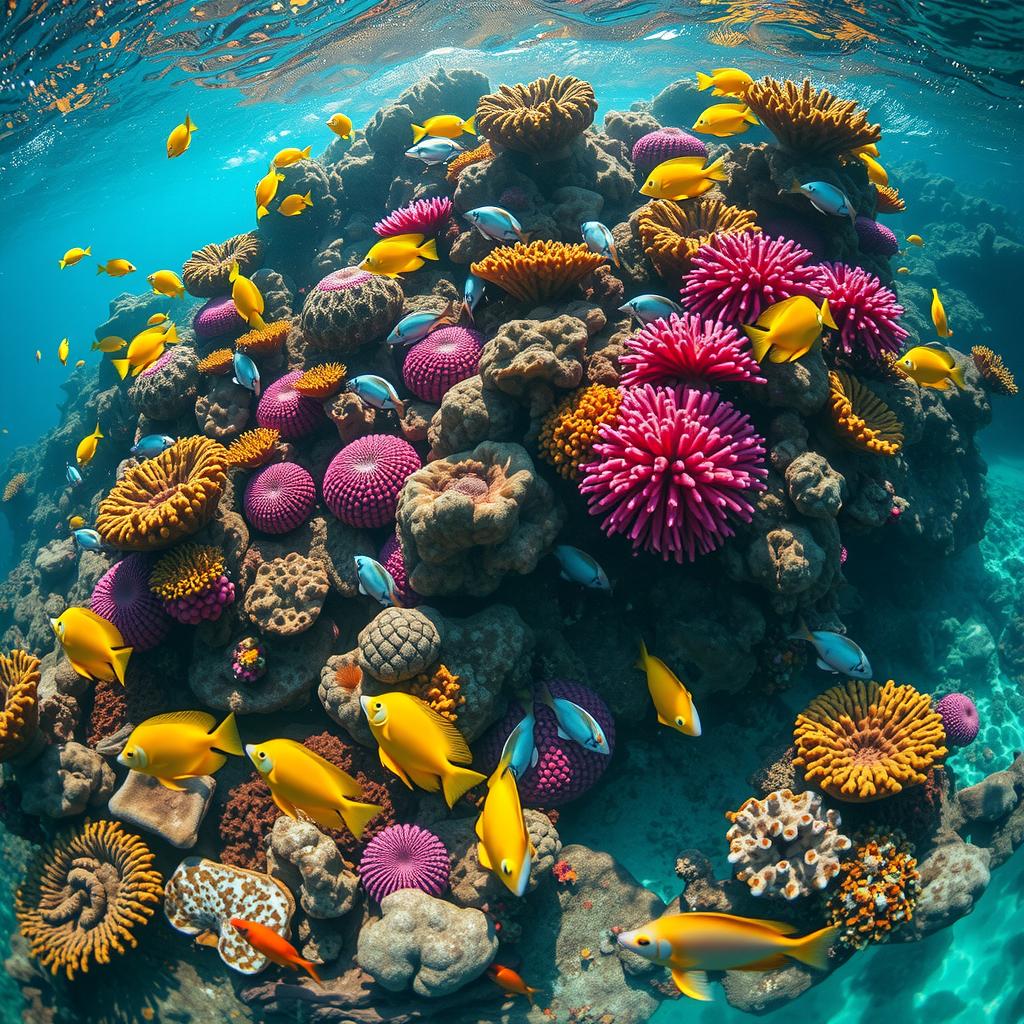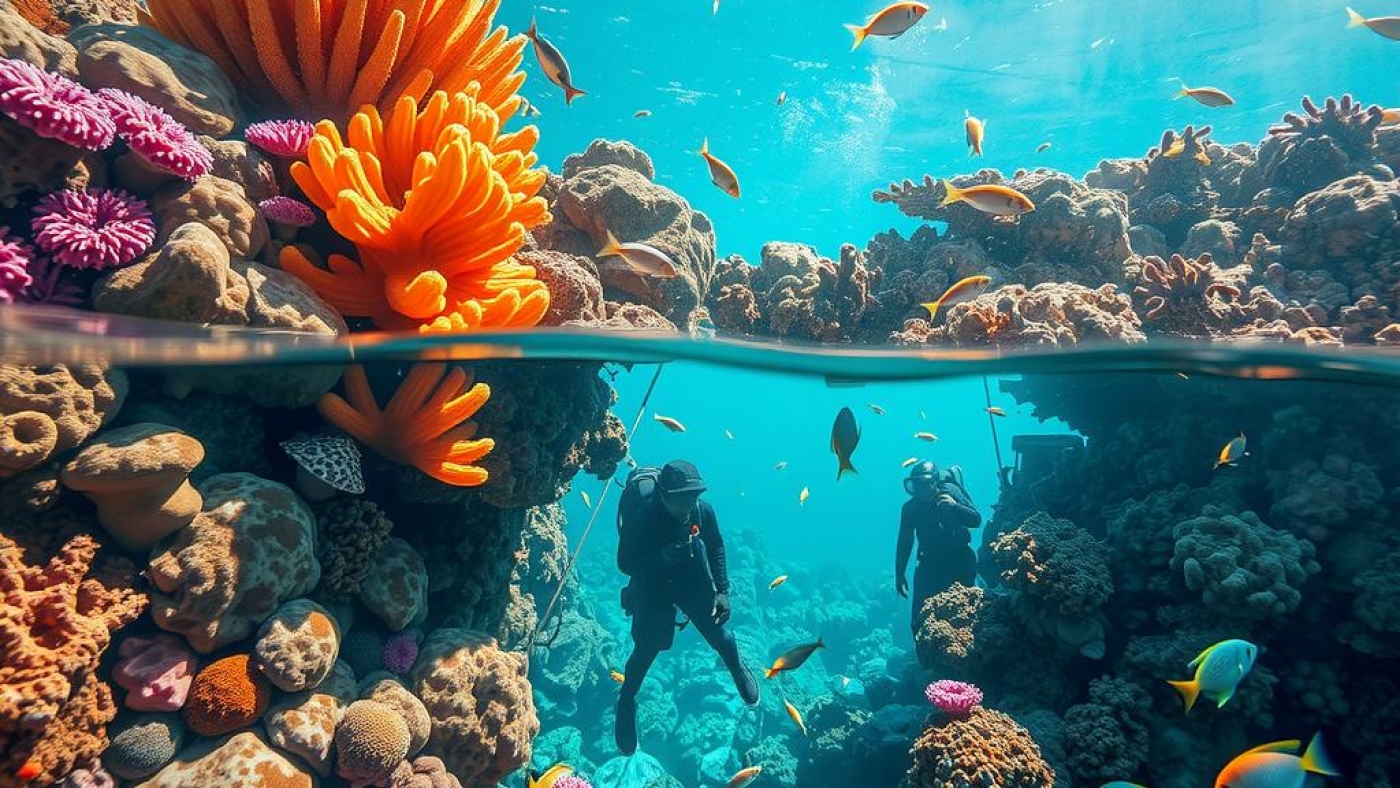Coral reefs are often dubbed the “rainforests of the sea,” harboring an astounding diversity of marine life and playing a crucial role in maintaining ecological balance. However, these vibrant underwater ecosystems face unprecedented threats from climate change, pollution, and overfishing. As scientists warn of alarming coral bleaching events and declining fish populations, it becomes increasingly clear that urgent action is needed to protect these vital habitats. For those passionate about marine conservation, coral reef conservation volunteer programs in the Caribbean present a unique opportunity to take part in meaningful initiatives aimed at reversing this trend.
These volunteer programs provide individuals with hands-on experience in various aspects of marine life protection while fostering greater environmental awareness among participants. By engaging with local communities and contributing to sustainable tourism initiatives, volunteers not only help restore delicate coral ecosystems but also support livelihoods dependent on healthy reefs. Through involvement in coral restoration projects, volunteers learn about the intricate relationships within marine environments and how they can positively impact them through eco-friendly volunteering practices.
The Caribbean is particularly rich in biodiversity yet remains vulnerable due to human activities. Therefore, effective Caribbean conservation efforts are essential for ensuring that future generations can enjoy its beauty and benefits. Participants who join these programs become ambassadors for marine conservation upon returning home; their experiences spark conversations around sustainability while amplifying critical awareness regarding our oceans’ plight.
This blog post delves deeper into the significance of participating in coral reef conservation volunteer programs. It highlights specific projects available across beautiful Caribbean locales where volunteers can immerse themselves fully into both work and play amidst breathtaking scenery teeming with life. Whether one seeks adventure or wishes to make a positive difference, understanding how such opportunities contribute toward broader ecological goals will inspire readers further—encouraging them not just to read on but also consider joining this crucial fight for preservation alongside like-minded individuals dedicated to protecting our planet’s precious resources.

Key Points:
- The Importance of Coral Reef Conservation: The vibrant coral reefs in the Caribbean are facing significant threats from climate change, pollution, and overfishing. Engaging in coral reef conservation volunteer programs allows individuals to contribute directly to the protection of these vital ecosystems that support marine biodiversity and coastal health.
- Hands-On Involvement in Restoration Efforts: Participants in these volunteer initiatives can expect to be actively involved in critical activities such as monitoring fish populations and taking part in coral restoration projects. This hands-on experience not only aids local Caribbean conservation efforts but also promotes sustainable tourism initiatives that benefit both environmental health and local communities.
- Education for Long-Term Impact: A key component of the experience is education about marine ecosystems’ fragility. Through participation in eco-friendly volunteering, volunteers gain valuable insights into how their actions can lead to broader impacts on global sustainability efforts, thereby enhancing their environmental awareness while fostering a deeper connection with marine life protection.

The Vital Importance of Coral Reefs
An Ecosystem Under Siege
Coral reefs are often referred to as the “rainforests of the sea,” showcasing extraordinary biodiversity and serving crucial roles in marine ecosystems, particularly in the Caribbean. These vibrant underwater structures not only provide habitat for countless species but also play an integral part in coastal protection by reducing wave energy and preventing erosion. Unfortunately, they face myriad threats including climate change, overfishing, pollution, and ocean acidification that jeopardize their survival. Rising sea temperatures lead to coral bleaching—a phenomenon that occurs when corals expel the algae living within them due to stress—resulting in significant mortality rates among these organisms. Moreover, unsustainable fishing practices and coastal development contribute further to habitat degradation. Engaging with coral reef conservation volunteer programs can help mitigate these threats while promoting sustainable tourism initiatives that benefit local communities economically without compromising environmental integrity.
Threats Facing Coral Reefs
A Call for Action
The urgency surrounding coral reef conservation cannot be overstated; actions must be taken swiftly to address both immediate and long-term challenges facing these ecosystems. In addition to climate-related impacts such as increased storm intensity and rising sea levels, human activities—including agricultural runoff containing fertilizers—which introduce harmful nutrients into marine environments exacerbate issues like algal blooms that suffocate corals. Furthermore, plastic pollution continues to plague our oceans with devastating effects on marine life protection efforts across the Caribbean region. By participating in eco-friendly volunteering opportunities focused on coral restoration projects or supporting environmental awareness programs aimed at educating locals about sustainable practices, individuals can contribute significantly toward reversing some of these detrimental trends.
Solutions Through Community Engagement
Empowering Local Initiatives
Addressing the plight of coral reefs requires a multifaceted approach involving community engagement alongside scientific research efforts aimed at understanding ecosystem dynamics better. Many successful restoration initiatives have emerged from collaborative partnerships between scientists and local stakeholders who recognize the intrinsic value of preserving their natural resources for future generations. Programs centered around coral reef conservation volunteer programs offer participants hands-on experiences where they assist researchers with fieldwork essential for monitoring reef health or even engaging directly in transplanting resilient coral species onto damaged reefs—actions vital for enhancing genetic diversity amidst changing conditions caused by climate change. Additionally, fostering connections between tourists seeking authentic experiences through eco-friendly volunteering options ensures greater awareness regarding marine conservation needs while simultaneously providing economic support for those dedicated toward protecting fragile habitats.
The Role of Sustainable Tourism
Bridging Conservation Efforts
Sustainable tourism serves as a powerful tool capable of bridging gaps between economic growth aspirations within Caribbean nations while advocating effective strategies needed for conserving precious resources like coral reefs effectively—the very backbone sustaining diverse marine life populations critical both ecologically and economically alike! By focusing on responsible travel practices coupled with participatory approaches offered via various coral reef conservation volunteer programs, visitors not only enjoy unique interactions with nature but also become ambassadors driving change back home through shared knowledge gained during their travels abroad! With conscientious choices made by travelers looking after both people’s livelihoods through job creation linked directly towards ensuring healthy ecosystems remain intact over time ultimately leads us one step closer towards safeguarding our planet’s invaluable treasures waiting just below its surface!
Engaging in Hands-On Conservation
A Journey into Coral Reef Protection
Engaging in volunteer programs focused on coral reef conservation offers individuals an invaluable opportunity to contribute meaningfully to marine life protection while gaining hands-on experience. These programs often take place in biodiverse regions such as the Caribbean, where vibrant ecosystems face significant threats from climate change and human activity. Volunteers participate in a variety of activities, including underwater surveys, coral restoration projects, and educational outreach initiatives aimed at raising environmental awareness among local communities and tourists alike. The impact of these efforts is profound; by actively engaging with coral reef conservation volunteer programs, participants not only aid in the rehabilitation of damaged reefs but also foster sustainable tourism initiatives that promote eco-friendly practices within the region.
Activities That Make a Difference
Exploring Volunteering Opportunities
The scope of activities involved in coral reef conservation volunteer programs ranges widely depending on the specific objectives of each project. Common tasks include monitoring coral health through data collection on species diversity and abundance or participating directly in coral restoration projects, which may involve growing corals in nurseries before transplanting them onto degraded reefs. Additionally, many organizations emphasize community engagement through workshops designed to educate locals about marine biodiversity’s importance and how they can help protect it. By involving volunteers from around the world, these programs create a powerful network dedicated to marine life protection, ultimately fostering global stewardship for fragile ecosystems.
The Impact on Local Conservation Goals
Measuring Success Through Volunteer Engagement
Local conservation goals are significantly advanced when volunteers partake in these hands-on experiences with their diverse skill sets and perspectives. For example, many volunteers bring expertise from various fields—science enthusiasts might contribute research skills while artists could enhance communication strategies with visually compelling materials that resonate with different audiences. Importantly, this collaborative effort contributes to long-term sustainability by integrating knowledge gained through participation into ongoing environmental awareness programs aimed at both residents and visitors alike. As volunteers witness firsthand the effects of climate change on delicate ecosystems like coral reefs during their time spent alongside trained professionals, they become more empowered advocates for ecological preservation upon returning home.
Building Sustainable Futures
Long-Term Benefits for Communities
Participation in coral reef conservation volunteer programs not only nurtures individual growth but also catalyzes broader community benefits such as improved local economies driven by ecotourism opportunities created through enhanced natural resources management practices. When visiting divers observe thriving reefs rejuvenated by restoration efforts led by dedicated volunteers over time—a direct outcome stemming from combined labor—their willingness to support environmentally responsible activities increases exponentially! Thus arises an essential cycle: engaged citizens inspire others toward conscientious living choices that prioritize sustainability while simultaneously preserving precious habitats critical for future generations’ enjoyment—a testament showcasing how impactful volunteering can be across intertwined domains.
In conclusion, engaging deeply within organized volunteer initiatives surrounding critical issues like those affecting our oceans creates ripples far beyond just immediate task completion; it shapes collective narratives surrounding environmental responsibility rooted firmly within personal actions taken today!
Education and Awareness: The Foundation of Change
Fostering Long-Term Commitment to Marine Conservation
In the realm of environmental stewardship, education plays a pivotal role in fostering long-term commitment to sustainability and marine life protection. Coral reef conservation volunteer programs are exemplary initiatives that not only engage participants with hands-on experiences but also educate them about the delicate ecosystems they aim to protect. These programs often take place in biodiverse regions such as the Caribbean, where volunteers can immerse themselves in various activities aimed at preserving coral reefs and promoting sustainable tourism initiatives. For instance, through participation in coral restoration projects, individuals gain firsthand insights into the challenges facing marine environments, including climate change and habitat degradation. This experiential learning cultivates a deeper understanding of ecological interconnections, enabling volunteers to become advocates for marine conservation even after their program concludes.
Moreover, these educational aspects transcend mere knowledge acquisition; they actively shape attitudes towards eco-friendly volunteering. Participants learn not only about the science behind coral ecosystems but also about effective community engagement strategies that foster local support for conservation efforts. By integrating environmental awareness programs into their frameworks, coral reef conservation volunteer programs equip individuals with tools necessary for driving meaningful change within their communities. Volunteers leave equipped not just with memories or skills but rather as ambassadors who can influence others’ perspectives on sustainability.
The impact is profound: when people witness the beauty of thriving underwater habitats during their time spent restoring corals or conducting research on marine life protection, it sparks an emotional connection that promotes lifelong dedication to these causes. Scientific studies have shown that personal experience significantly enhances retention rates concerning environmental issues—volunteers are more likely to adopt sustainable practices upon returning home if they’ve directly engaged with nature’s wonders.
In conclusion, by embedding educational components within coral reef conservation volunteer programs, organizations create pathways toward lasting ecological impact while nurturing passionate advocates for our oceans’ future.
Engaging Hearts and Minds
Transforming Experiences into Lifelong Advocacy
The transformative power of engaging both hearts and minds cannot be overstated when it comes to fostering passion for marine life protection through education-focused initiatives like coral reef conservation volunteer programs. Such opportunities provide participants an invaluable blend of adventure and responsibility as they work alongside scientists dedicated to advancing understanding around coral health dynamics amidst growing threats from human activity and climate variability.
As these volunteers dive deep into practical applications surrounding biodiversity monitoring or participate actively in habitat restoration tasks under expert guidance—they cultivate essential skills that extend beyond mere academic study; teamwork becomes second nature while problem-solving abilities sharpen dramatically amid challenging conditions unique within aquatic settings.
Furthermore—the camaraderie established among peers participating together amplifies individual motivation levels exponentially—as shared experiences often lead discussions sparking new ideas related specifically towards implementing innovative solutions addressing pressing global concerns affecting fragile coastal zones worldwide! By facilitating workshops discussing topics ranging from ocean acidification impacts down through economic benefits associated directly tied back towards protecting regional resources—these immersive formats ensure everyone leaves having gained vital insights applicable across diverse contexts!
Thus—it’s clear why investing time volunteering leads effortlessly towards becoming informed stewards committed tirelessly advocating principles underscoring responsible interaction between humanity & nature alike! With every brushstroke applied repairing damaged reefs paired harmoniously alongside educational outreach efforts instilling appreciation amongst locals visiting sites—a ripple effect emerges promising brighter futures awaiting generations ahead still heavily reliant upon Earth’s irreplaceable treasures found beneath azure waves…
Frequently Asked Questions:
Q:What are coral reef conservation volunteer programs?
A:Coral reef conservation volunteer programs are initiatives that allow individuals to actively participate in efforts aimed at protecting and restoring coral reefs. These programs often involve hands-on activities such as monitoring fish populations, conducting underwater surveys, and assisting with coral restoration projects. Participants contribute significantly to local Caribbean conservation goals while enjoying the beauty of marine environments.
Q:How can I benefit from participating in these volunteer programs?
A:Engaging in coral reef conservation volunteer programs not only provides a unique travel experience but also enhances environmental awareness among participants. By immersing themselves in educational activities focused on the fragility of marine ecosystems, volunteers develop a deeper understanding of how their actions can impact global sustainability efforts. This knowledge empowers them to advocate for marine life protection within their own communities after returning home.
Q:Are there any requirements for joining these eco-friendly volunteering opportunities?
A:Most coral reef conservation volunteer programs welcome individuals from various backgrounds, regardless of experience level. However, participants should have a genuine interest in marine ecosystems and be ready for physical activity involved in fieldwork. Many organizations offer training sessions to equip volunteers with necessary skills prior to engaging in tasks related to sustainable tourism initiatives, ensuring everyone contributes effectively while enjoying their time under the waves.
